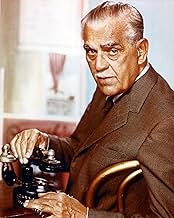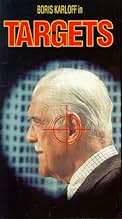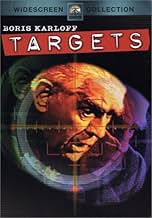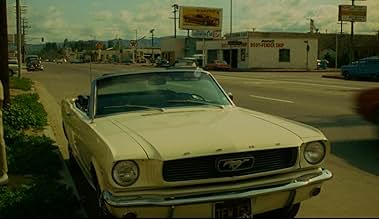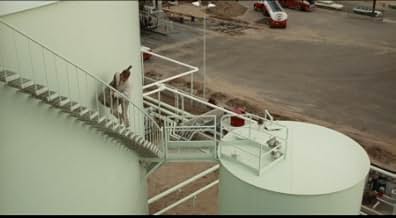Ein älterer Horrorfilmstar konfrontiert während eines persönlichen Auftritts in einem Autokino einen psychotischen Vietnamkriegsveteranen, der sich in einen massenmordenden Scharfschützen ve... Alles lesenEin älterer Horrorfilmstar konfrontiert während eines persönlichen Auftritts in einem Autokino einen psychotischen Vietnamkriegsveteranen, der sich in einen massenmordenden Scharfschützen verwandelt hat.Ein älterer Horrorfilmstar konfrontiert während eines persönlichen Auftritts in einem Autokino einen psychotischen Vietnamkriegsveteranen, der sich in einen massenmordenden Scharfschützen verwandelt hat.
- Auszeichnungen
- 1 wins total
- Marshall Smith
- (as Monty Landis)
- Waiter
- (as Tim Burns)
Handlung
WUSSTEST DU SCHON:
- WissenswertesRoger Corman told director Peter Bogdanovich that he could make any film that he wanted to, on two conditions: he had to use stock footage from the film The Terror - Schloß des Schreckens (1963), and he had to hire Boris Karloff for two days (Karloff was under contract to Corman and owed him those two days). Karloff was so impressed with the film's script, however, that he refused any pay for any shooting time over his contracted two days. He worked for a total of five days on it.
- PatzerBobby's check to the gun shop is dated late July, but when Orlok picks up a newspaper story about the supermarket massacre several days later, the paper carries a March date.
- Zitate
Byron Orlok: Ladies and gentlemen, boys and girls, I'd like to leave you with a little story to think about as you drive home - through the darkness. Once upon a time, many years ago - there should be a pin spot on my face as I'm talking - once upon a time, many, many years ago, a rich merchant in Baghdad sent his servant to the marketplace to buy provisions. And after a while, the servant came back, white-faced and trembling, and said, "Master, when I was in the marketplace, I was jostled by a woman in the crowd, and I turned to look, and I saw that it was Death that jostled me. And she looked at me and made a threatening gesture. Oh, Master, please, lend me your horse, that I may ride away from this city and escape my fate. I will ride to Samara, and Death will not find me there." So the merchant loaned him the horse, and the servant mounted it and dug his spurs into its flank, and as fast as the horse could gallop, he rode towards Samara. Then the merchant went to the marketplace, and he saw Death standing in the crowd, and he said to her, "Why did you make a threatening gesture to my servant when you saw him this morning?" And Death said, "I made no threatening gesture. That was only a start of surprise. I was astonished to see him here in Baghdad, for I have an appointment with him tonight in Samara."
- Crazy CreditsThe film's original theatrical prints began with a written title card that read, "Why gun control? Why did a lunatic sniper kill or maim 11 innocent victims in Texas on June 3, 1966? Why were over 7,000 Americans slain or wounded by gunfire in 1967? Why in 1968 after assassinations and thousands of more murders has our country no effective gun control law? This motion picture tells a story that sheds a little light on a very dark and a very deep topic." This title card was added by Paramount Pictures only as a result of the then-recent assassinations of both Doctor Martin Luther King and Senator Robert F. Kennedy, but it was not approved by the film's director, Peter Bogdanovich at all and, as a result of this, it was removed from all later releases of the film, including those for home video.
- Alternative VersionenThe film was cut for a "GP" rating only once, mainly for a 1971 re-release of it in order to capitalize on the success of Peter Bogdanovich's then-recent hit film, Die letzte Vorstellung (1971). Later releases of it on home video were all uncut.
- VerbindungenFeatured in 100 Jahre Horror- und Gruselfilme: Boris Karloff (1996)
- SoundtracksGreen Rocky Road
(uncredited)
Written and performed by The Daily Flash (Don MacAllister, Steve Lalor, Jon Keliehor and Doug Hastings)
Cineaste Peter Bogdanovich's debut directing effort, sadly, to this day remains a topical hot spot. Released as it was just after the assassinations of Martin Luther King Jr. and Robert Kennedy, Targets carried much relevance even though it was hardly a success at the box office. Over the years it has come to gain a cult following that is much deserved, the low budget production value actually helping to keep it uneasily potent.
Story is structured by way of two separate narrative threads, one sees Karloff as veteran horror film actor Byron Orlock, who sees himself as an anachronism and announces his retirement from movie making. His reasoning, warranted, is that his type of horror is way behind the times, the real horror is out there on the streets, bleakly headlined in the local newspaper. The other thread concerns Bobby Thompson (O'Kelly), a handsome boy next door type who has a pretty wife but finds himself unemployed and still living with his parents. He is a ticking time bomb, his mind soon to fracture and devastation will follow. The two stories converging for a bloody finale at a drive in movie theatre, where Orlock is making a special guest appearance, the old time horror of the movies coming face to face with the real terror of the modern world.
Though uncredited by choice, the screenplay belongs to Fuller, something that Bogdanovitch has always been keen to point out, and it's with the writing where the film gets its quality factor. The messages within are serious and handled evenly by Bogdanovitch, his pacing precise and in Karloff he has the perfect icon from which to underpin the story. True enough the acting around Karloff is sub-standard, notably from the director himself, but with Bogdanovich deliberately keeping the psychological explanation for Bobby's actions vague, film manages to rise above its flaws to leave an indelible mark. 8/10
- hitchcockthelegend
- 23. Juli 2011
- Permalink
Top-Auswahl
- How long is Targets?Powered by Alexa
Details
Box Office
- Budget
- 130.000 $ (geschätzt)
Zu dieser Seite beitragen



